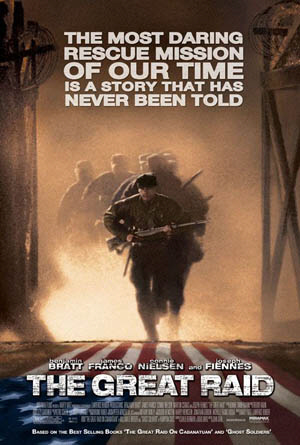


|
"The
Great Raid" Revives Real Heroes, Old Hollywood Reviewed by Graham H.
Moes Rating: B+ About halfway through The Great Raid, there's a scene in which a U.S. Army Ranger stoops to draw a map in the dirt. It's the kind John Wayne, Audie Murphy and Gregory Peck always used to draw, using combat knife or bayonet, to brief their men for the fight ahead. Watching it here, I realized how long it's been since I've seen it done and how perfectly it sums up this welcome throwback to the good old days when Hollywood contributed to America's war efforts with both righteous propaganda and manpower. (Don't hold your breath waiting for Quentin Tarantino or Ben Affleck to enlist the way Frank Capra and Clark Gable once did.) The Great Raid begins and ends with genuine newsreel footage of the 1945 attempted rescue — by a handful of untested Army Rangers — of hundreds of American POWs slated for extermination in the Philippines by the retreating Japanese. The movie version of these events coalesces around a triple-plot structure: Scenes of the Rangers' progress through enemy-infested territory (starring Benjamin Bratt and James Franco) actually take a back seat early on to the death-camp survival drama of a malaria-ravaged POW (Joseph Fiennes) and the nurse in Manila (Connie Nielsen) playing a dangerous black-market game for the medicine keeping Fiennes and his men alive. The film plays it straight, out of respect for history. No over-choreographed John Woo action scenes or tough-guy one-liners here. No morally ambiguous ponderings on the nature of war or other attempts at "nuanced" (pretentious) drama. And while it may, as a result, lack the devastating impact of that brand of filmmaking at its best (Saving Private Ryan), it feels more authentic. This straightforward approach actually boosts the film's aura of jeopardy. As a true story, there's no telling who will live or die, giving everything from the black-market intrigue to the climactic raid a layer of real dread not often available from works of pure fiction. The grand finale raid itself, as artless as the rest of the film, becomes even more compelling. Lit only by the rocket's red glare, the nighttime assault on tyranny takes on an improvised, chaotic quality that reminds us these things actually happened. Again, it's classic Hollywood, reminiscent of films like Objective, Burma!, Bridge on the River Kwai, Sands of Iwo Jima — even Casablanca, in a romance subplot representing the film's one indulgence. For those Pacific Theater war-movie buffs keeping score, it's far superior to Back to Bataan and on par with Objective, Burma!, a gritty, true gem of a film actually shot in 1945 at the height of the war. Like that film, unusually graphic for its day, the much more brutal Raid refuses to handle the enemy with politically correct kid gloves. The film depicts Imperial Japanese brutality for what it was — absolute and unquestioned — sparing us even the cop-out, token "good" character struggling with conscience. (They didn't exist, folks.... Ask anyone who survived the Death March.)
For once someone understands, as much as we may hate the Japanese in the film, we're capable of leaving our emotions at the door on the way out. The acting here is at times a throwback, too. James Franco (Spider Man) plays his assault-leader role with a low-key (OK, stiff.) All-American quality perhaps unintentionally old school. But it works. Benjamin Bratt, too, while somewhat cardboard as the Ranger CO early on, gives just enough to get the job done. Joseph Fiennes, after
taking the world by storm in Shakespeare in Love,
has shunned the big time since, patching together a
career out of roles in small films like this. As with his
recent work in the Protestant Reformation-themed
historical drama Luther (talk about shunning the
big time), he raises the bar for his fellow cast members
again in a role that required some real physical demands
in addition to the emotional ones. (Malnutrition has
rarely looked so authentic and taxing.)
Filling out the cast is a platoon of actors we've seen before, but can't place where. Again fitting in a selfless film about selfless heroes. A film in which even the end credits play small and unobtrusively in a corner of the screen, ensuring eyes stay glued to those people in the newsreels, not the names of the actors who merely played them. The Great Raid
has been in theaters for weeks already, with next to no
studio marketing support. It needs strong word of mouth
if it's to survive much longer. (At the very least, don't
miss it on DVD, where it should sell like hotcakes in red
state Yet it deserves better than mere survival. Whether designed to boost the morale of our troops in our present world war or not — at a time when Hollywood has yet to release a single film in support of their sacrifices (and actually has a few in the works promising the opposite) — this film fills the vacuum. Thankfully, today's frontline heroes say they still feel the love from the folks back home — the standing ovations in airports, the bumper stickers on so many cars, the care packages containing movies that honor their service. The beauty of this film is how, even while inspiring us to thank today's soldiers, it also reminds us how important it is not to forget to salute their grandparents too. |
||||